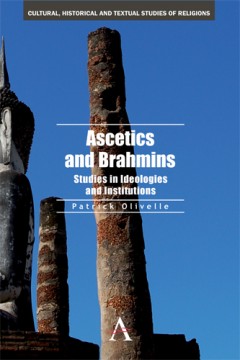Ascetics and Brahmins
Studies in Ideologies and Institutions
By Patrick Olivelle
Cultural, Historical and Textual Studies of South Asian Religions
Other Formats Available:
- About This Book
- Reviews
- Author Information
- Series
- Table of Contents
- Links
- Podcasts
About This Book
This volume brings together a variety of Patrick Olivelle’s papers on Indian ascetical institutions and ideologies that have been published over the past thirty or so years. Asceticism represents a major strand in the religious and cultural history of India, providing some of the most creative elements within Indian religions and philosophies. Most of the major religions, such as Buddhism, Jainism, and the religious philosophies both within these new religions and in the Brahmanical tradition, were created by world-renouncing ascetics. Ascetical institutions and ideologies developed in a creative tension with other religious institutions that stressed the centrality of family, procreation and society, and it is this tension that has articulated many of the central features of Indian religion and culture. The papers collected in this volume seek to locate Indian ascetical traditions within their historical, political and ideological contexts.
Reviews
Author Information
Patrick Olivelle is Professor of Sanskrit and Indian Religions at the University of Texas at Austin, where he served as Chair of the Department of Asian Studies from 1994 to 2007. He previously taught in the Department of Religious Studies at Indiana University, Bloomington from 1974 to 1991, where he was the Department Chair from 1984 to 1990.
Series
Cultural, Historical and Textual Studies of South Asian Religions
Anthem South Asian Studies
Table of Contents
Abbreviations; Preface; 1. Introduction to Renunciation in the Hindu Traditions; 2. The Ascetic and the Domestic in Brahmanical Religiosity; 3. Village vs. Wilderness: Ascetic Ideals and the Hindu World; 4. A Definition of World Renunciation; 5. From Feast to Fast: Food and the Indian Ascetic; 6. The Beast and the Ascetic: The Wild in the Indian Religious Imagination; 7. Deconstruction of the Body in Indian Asceticism; 8. Contributions to the Semantic History of ‘samnyasa’; 9. The Semantic History of ‘asrama’; 10. Renunciation in the ‘Samnyasa Upanisads’; 11. Odes of Renunciation; 12. Ritual Suicide and the Rite of Renunciation; 13. The Renouncer’s Staff: ‘trivistabdha’, ‘tridanda’, and ‘ekadanda’; 14. ‘Pancamasramavidhi’: Rite for Becoming a Naked Ascetic; 15. Anandatirtha’s ‘Samnyasapaddhati’: A Handbook for Madhvaite Ascetics; 16. Renouncer and Renunciation in the ‘Dharmasastras’; 17. King and Ascetic: State Control of Asceticism in the ‘Arthasastra’; Bibliography; Index
Links
Stay Updated
Information
Latest Tweets



